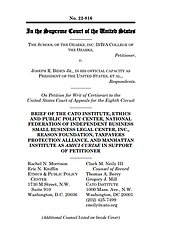Learn more about Cato’s Amicus Briefs Program.
When federal agencies choose to make binding policy prospectively, those agencies are typically required to give interested parties an opportunity to influence the development of such rules through a process known as “notice-and-comment rulemaking.” To promulgate these binding rules, agencies are required by the Administrative Procedure Act (APA) to publish a general notice of proposed rulemaking and then give interested persons an opportunity to submit written data, views, or arguments for the agency to consider. Agencies may not ignore these comments; rather, they must respond to any relevant, significant issues that are raised by interested parties.
These procedures exist for good reasons. The notice-and-comment process facilitates the important democratic value of allowing interested parties and the public to participate in deliberative lawmaking. This participation is critical to the creation of rational rules that are not arbitrary or capricious. And public participation guards against imposing unnecessary costs on regulated parties due to harms in a rule that an agency could have been alerted to.
But because of the hurdles that the notice-and-comment process places on agency rulemaking, agencies are incentivized to exploit exceptions to notice-and-comment rulemaking where they can. “Interpretative rules” and “general statements of policy,” for instance, are exempted from the process. To avoid the procedures required by notice and comment, agencies will frequently characterize their rules—which may be binding on parties for all practical purposes —as nonbinding “interpretative rules” or “general statements of policy”.
That is exactly what happened when, in 2021, the U.S. Department of Housing and Urban Development (HUD) issued an important “Directive” without notice-and-comment rulemaking. That Directive ordered HUD to change how it enforces the Fair Housing Act’s (FHA) prohibition against sex discrimination in housing. The Directive concluded that the FHA prohibits not only discrimination on the basis of sex but also discrimination on the basis of “sexual orientation” and “gender identity.” Limiting the agency’s discretion, the Directive described HUD’s previous approach to discrimination on these matters as “insufficient,” called out institutions of education for allegedly perpetuating “injustices” in housing, and insisted on full enforcement of the FHA. Regardless of the merits of the policy, interested parties would have benefitted from participating in notice-and-comment rulemaking during its development. But HUD denied interested parties that opportunity.
The College of the Ozarks, a private Christian college in Missouri, challenged the Directive in federal court. The College argued that it reasonably feared it would be liable under the Directive for the College’s policy of separating its student housing based on biological sex. The College argued, among other things, that HUD’s failure to promulgate the Directive through the notice-and-comment process was itself an injury sufficient to give the College standing to sue the agency in federal court. But the lower court disagreed, holding that the College needed to establish a separate injury in addition to the lack of opportunity to participate in notice-and-comment rulemaking.
The College has now filed a petition asking the U.S. Supreme Court to take its case solely on the question of standing, and Cato has filed an amicus brief supporting that petition, joined by the Ethics and Public Policy Center, National Federation of Independent Business Small Business Legal Center, Reason Foundation, Taxpayers Protection Alliance, and Manhattan Institute. In the brief, we explain why the right to notice-and-comment rulemaking is not a bare and meaningless procedural right. Rather, when agencies circumvent notice-and-comment rulemaking, it imposes real costs on parties, and public policy suffers. We urge the Supreme Court to review the case and find that the procedural right to notice and comment rulemaking is itself sufficient to establish Article III standing for interested parties like the College.

This work is licensed under a Creative Commons Attribution-NonCommercial-ShareAlike 4.0 International License.


